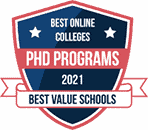
Ph.D. in Education – Special Education
Become a Leader in Special Education
If you’re an educational professional seeking a career as a university faculty member or senior educational administrator in the in-demand arena of special education, then this path will help you achieve your goal and make a big impact too. Regent’s Doctor of Philosophy (Ph.D.) in Education – Special Education prepares special education teachers and administrators to advance in special education research, practice, and policy. This research-based Ph.D. can prepare you more specifically for a career in academia. You can enjoy developing advanced proficiencies in the theoretical and analytical applications and comprehensive knowledge of the special education field. The program is ideal for professionals seeking a career as a university faculty member or senior educational administrator.
INCREASE YOUR EARNING POTENTIAL
Capitalize on a higher salary with your Ph.D. degree.
EXPAND YOUR CAREER PATH
Take your career to the next level with exciting leadership opportunities.
MAKE AN IMPACT IN SPECIAL EDUCATION
Present ground-breaking research to improve the world of education.
ALIGN YOURSELF WITH EXCELLENCE
Regent has been ranked among the Top National Universities by the U.S. News & World Report (2025). Our programs have also been ranked among the Top 10 Best Online Graduate Education Programs in Virginia for 13 years in a row (2013-2025).
Presented from a Christian worldview, this specialty degree is supported by award-winning faculty in Virginia Beach.
Please complete the Request Information form on this page to learn more about this program.
On completing the Ph.D. in Education – Special Education degree, you can:
- Explain the history of special education, as well as current issues and best practices.
- Interpret data and ramifications; craft empirical, research-based interventions; and codify research and practice for effective implementation.
- Develop vital skills in critical thinking, scholarly research, writing, and learning from a Christian worldview.
Career Opportunities
- Special Education Administrator
- Special Education Executive Leader
- University Faculty
| EFND 725 | Advanced Study of Best Practices in Special Education | 3 | Advanced study of empirically based interventions for children with mild disabilities for academic, emotional, and social deficits. Emphasis on current best practices and practices often used but empirically unsupported as well as legal and ethical issues surrounding intervention implementation. |
| ESPC 705 | History of Special Education | 3 | An advanced historical survey of the origins of special education. Focus on historical figures in special education, their theories of and interventions with people with disabilities; on the evolution of the social construction of disability; on broad legal and ethical issues related to people with disabilities; and on some current issues facing the field. |
| ESPC 710 | Advanced Study of High-Incidence Disabilities | 3 | Advanced study of special education high-incidence disability categories: Learning Disabilities, Emotional and Behavioral Disturbance, and Intellectual Disabilities. Focus on the historical development of identification, including distinguishing characteristics and definitions, as well as empirically based interventions that address characteristic issues of each group. |
| ESPC 730 | Meta-Analysis in the Social Sciences | 3 | Advanced course in understanding and executing meta-analyses in special education or other social sciences. Study of the history of meta-analysis, its major functions and limitations, and the successful completion of a meta-analysis in a social science area. Prerequisite: Permission of instructor; prior completion of core courses in statistics and research design (e.g., EFND 702 & 722 or equivalent). |
| ESPC 740 | Fad Interventions in Special Education | 3 | Advanced study of empirically unsupported yet perennially popular interventions for children with disabilities. |
| ESPC 800 | Doctoral Seminar: The Editorial & Review Process | 3 | Advanced study of the entire publishing process from submission to publication for both authors and editors in special education or closely related areas. Examination of publication objectives for different audiences such as refereed vs. non-refereed journals and other publication formats. Study of duties related to guest reviewing, regular reviewing, editorial board duties, responsibilities of refereed journal editors and co-editors. Guest lectures by editors of journals in special education or related social science fields focusing on single/multiple author works and responsibilities, submitting or editing special journal issues highlighting current research and practice, and copy-editing for final printing. Writing and submitting an original article to a refereed journal. Prerequisite: Permission of Instructor. |
| ESPC 830 | International Special Education | 3 | Advanced review of international special education; UN Charter, the UN Universal Declaration of Human Rights, the UN Convention on the Rights of the Child to the Salamanca Statement and the Rights of Persons with Disability, and attention to special education in the developing world. |
| ESPC 840 | Bioethics in Special Education | 3 | Advanced study of the modern origins of bioethics and its relation to persons with disabilities with particular attention to genetic fetal anomalies, assisted suicide, and euthanasia. |
2024-25 Semester Check-In Deadlines
All students are expected to check-in for the semester two weeks before the session start date. Students should apply, be accepted, enroll in their first courses, and confirm a plan to pay for their courses prior to this date.
| Session | Semester Check-In | Session Start Date |
|---|---|---|
| Session A | Friday, August 9 | Monday, August 19 |
| Session M | Friday, September 6 | Monday, September 16 |
| Session B | Friday, October 11 | Monday, October 21 |
| Session C | Wednesday, January 8 | Monday, January 13 |
| Session T | Friday, January 31 | Monday, February 10 |
| Session D | Friday, March 7 | Monday, March 17 |
| Session E | Friday, May 2 | Monday, May 12 |
| Session F | Friday, June 13 | Monday, June 23 |
Admissions Requirements
Step 1: Apply to Regent University
Submit your application using the Regent University Online Application.
Note: If you are unable to complete our application due to a disability, please contact our Admissions Office at 757.352.4990 or admissions@regent.edu and an admissions representative will provide reasonable accommodations to assist you in completing the application.
Step 2: Submit Your Unofficial Transcripts
Submit your unofficial transcripts to regent.edu/items.
Upon submitting your application, you will receive an email requesting authorization for Regent University to obtain your official transcripts from your U.S. degree-granting institution. International transcripts must be evaluated by a NACES, AACRAO or NAFSA approved agency.
Step 3: Submit Your Government-Issued ID
To ensure academic integrity, Regent University requires a copy of a government-issued ID. Please submit a scanned copy or photograph of it to regent.edu/items.
Please feel free to contact the Office of Admissions at 757.352.4990 or admissions@regent.edu should you have any further questions about the application process.
Note: All items submitted as part of the application process become the property of Regent University and cannot be returned.
PART-TIME STUDENTS
| Degree | Tuition Cost Per Credit Hour | Average Credit Hours Per Semester | Average Tuition Per Semester |
|---|---|---|---|
| Master of Education (M.Ed.) | $585 | 6 | $3,510 |
| Educational Specialist (Ed.S.) | $820 | 6 | $4,920 |
| Doctor of Education (Ed.D.) | $820 | 3 | $2,460 |
| Doctor of Philosophy (Ph.D.) | $820 | 3 | $2,460 |
Full-Time Students
| Degree | Tuition Cost Per Credit Hour | Average Credit Hours Per Semester | Average Tuition Per Semester |
|---|---|---|---|
| Master of Education (M.Ed.) | $585 | 9 | $5,265 |
| Educational Specialist (Ed.S.) | $820 | 9 | $7,380 |
| Doctor of Education (Ed.D.) | $820 | 6 | $4,920 |
| Doctor of Philosophy (Ph.D.) | $820 | 6 | $4,920 |
Student Fees Per Semester
| University Services Fee (On-Campus Students) | $900 (Fall & Spring) $750 (Summer) |
|---|---|
| University Services Fee (Online Students) | $750 |
PART-TIME STUDENTS
| Degree | Tuition Cost Per Credit Hour | Average Credit Hours Per Semester | Average Tuition Per Semester |
|---|---|---|---|
| Master of Education (M.Ed.) | $565 | 6 | $3,390 |
| Educational Specialist (Ed.S.) | $800 | 6 | $4,800 |
| Doctor of Education (Ed.D.) | $800 | 3 | $2,400 |
| Doctor of Philosophy (Ph.D.) | $800 | 3 | $2,400 |
Full-Time Students
| Degree | Tuition Cost Per Credit Hour | Average Credit Hours Per Semester | Average Tuition Per Semester |
|---|---|---|---|
| Master of Education (M.Ed.) | $565 | 9 | $5,085 |
| Educational Specialist (Ed.S.) | $800 | 9 | $7,200 |
| Doctor of Education (Ed.D.) | $800 | 6 | $4,800 |
| Doctor of Philosophy (Ph.D.) | $800 | 6 | $4,800 |
Student Fees Per Semester
| University Services Fee (On-Campus Students) | $850 (Fall & Spring) $700 (Summer) |
|---|---|
| University Services Fee (Online Students) | $700 |
*Rates are subject to change at any time.
Ph.D. Requirements
A Ph.D. student will (a) complete 21 hours associated with the Ed.D. core curriculum, (b) complete 24-26 hours associated with an Ed.D. concentration, (c) complete an additional 6 hours of research related credit, and (d) complete 16 hours of dissertation research credit—the total program is 67 hours. A candidate for the Ph.D. degree must present an acceptable research-based dissertation. The dissertation demonstrates that the candidate has technical competence in the field and has done research of an independent character. It must add to or modify what was previously known in the candidate’s field of interest or present a significant interpretation of the subject based upon original investigation and research.
Ph.D. students are required to take the following courses:
EDCO 806 Multivariate Statistics (3)
EHEA 805 Advanced Research Design and Analysis (3)




